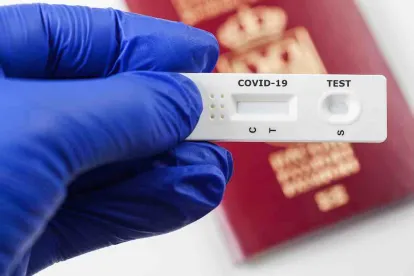For over a year now, there has been speculation about how the Biden Administration would handle the chronically vexing regulatory issues associated with laboratory-developed tests (LDTs). On November 15, 2021, we finally got our answer when the August 2020 policy put in place by the Trump Administration was officially withdrawn. The Food and Drug Administration (FDA) also released corresponding updates to various guidelines related to the testing response to the ongoing public health emergency. Before summarizing all of these critically important developments, we’ll provide a quick history of what has been going on with LDTs since the pandemic began.
As we’ve outlined in prior posts (see here and here), FDA regulates the manufacturing of test kits by diagnostics manufacturers under its medical device authorities but historically exercised regulatory discretion to allow labs to use their own LDTs pursuant to rules established under the Clinical Laboratory Improvement Amendments (CLIA), which is administered and enforced by the Centers for Medicare and Medicaid Services (CMS). At the start of the pandemic in early 2020, labs developing their own LDTs to provide COVID-19 testing and diagnosis were encouraged to seek emergency use authorizations (EUAs) for those tests from the FDA. Then, on August 19, 2020, the Department of Health and Human Services (HHS) under former HHS Secretary Alex Azar announced that the Department was rescinding all informal policy documents issued by FDA related to LDTs because FDA had not engaged in notice-and-comment rulemaking. (See also some discussion of that action in our 2020 devices year-end post, available here.) As a result, such products were no longer required to secure an EUA – or other non-emergency marketing authorization for non-COVID tests – from the agency prior to being launched commercially. Over the subsequent 15 months, FDA regularly declined to review EUA requests from LDT developers and deprioritized those products in order to focus on at-home collection kits and at-home tests, point-of-care tests for medical professionals, and high-throughput, widely distributed tests. That situation has created many frustrations for clinical laboratories that, for business, legal, or other reasons, wanted to receive formal permission from FDA before putting a COVID-19 test into the marketplace.
On November 15 of this year, however, HHS pressed the reset button on the regulation of COVID-19 LDTs, allowing FDA to require clinical labs to submit EUA requests for such tests. The same day, FDA issued a revised Policy for Coronavirus Disease-2019 Tests During the Public Health Emergency and an umbrella EUA for serial testing using certain laboratory-developed diagnostic tests and also updated almost all of its FAQ on COVID-19 testing. Importantly, FDA is emphasizing in the revised COVID-19 testing policy and the corresponding press release that any clinical laboratory currently offering a COVID-19 LDT must obtain an EUA to continue performing and marketing such test. Specifically, the revised COVID-19 testing policy states in relevant part:
Diagnostic and Serology Tests on Notification Lists for which an EUA Request was Submitted
For SARS-CoV-2 diagnostic or serology tests on one of the notification lists and for which an EUA request was submitted prior to issuance of this updated guidance, FDA does not intend to object to continued distribution or offering of those tests for a period of time while FDA reviews the EUA requests for the tests where:
1) The developer submitted its EUA request after February 1, 2021; or
2) The developer submitted its EUA request prior to February 1, 2021 and the developer confirms to FDA, within 45 calendar days from the date of issuance of this updated guidance, that:
a) the developer wants FDA to continue reviewing its EUA request;
b) the EUA request is for the current version of the test; and
c) either the developer does not have additional data to add, or the developer submits updated information to FDA within that 45 calendar-day timeframe….
If FDA does not receive confirmation from a test developer that submitted its EUA request prior to February 1, 2021 confirming that the developer wants FDA to continue reviewing its EUA request, FDA intends to decline to review (or decline to further review where review has already begun) the EUA request.”
Laboratory Serology Tests on the Notification List and Certain LDTs for Which an EUA Request was Not Submitted
Certain serology tests developed by laboratories are being offered without FDA authorization after the developer notified FDA as described in the previous version of this guidance. In addition, FDA understands that some LDTs for SARS-CoV-2 are being offered without FDA authorization or submission of an EUA request following the August 2020 HHS Announcement….
For such tests, FDA does not intend to object to continued offering of the tests while FDA reviews the EUA requests where the developer submits the EUA request to FDA through an email to CDRH-EUA-Templates@fda.hhs.gov within 60 calendar days from the date of issuance of this updated guidance.”
FDA’s November 15th press release also describes the agency’s current areas of focus for EUA reviews:
-
At-home and point-of-care diagnostic tests that can be produced in high volumes;
-
High-volume, lab-based molecular diagnostic tests (and corresponding home specimen collection kits) that enable specimen pooling to increase throughput, asymptomatic screening, and the detection of multiple respiratory viruses, or that employ other methods to increase capacity and accessibility;
-
Lab-based and point-of-care high-volume quantitative antibody tests; and
-
Tests submitted or supported by a U.S. government stakeholder, such as the Biomedical Advanced Research and Development Authority or the National Institutes of Health’s Rapid Acceleration of Diagnostics.
The agency goes on to recommend that developers of COVID-19 tests other than the types described above should “consider pursuing marketing authorization through traditional device review pathways such as 510(k) notification or De Novo classification.”
This sudden reversal in policy and reestablishment of regulatory restrictions and requirements will undoubtedly lead to a scramble by many clinical laboratories to reengage with FDA and obtain authorization for their COVID-19 LDTs. Unfortunately, however, it appears the agency is poised to decline review or authorization of many currently unauthorized LDTs that are not within FDA’s current review priorities.
It is important to note that non-COVID-19 LDTs remain under enforcement discretion after HHS’s withdrawal of the August 2020 policy, so it is unclear whether or how FDA will use enforcement actions to sanction clinical laboratories that continue to offer COVID-19 LDTs without authorization. If FDA does end up rejecting a majority of new LDTs because they do not meet the current EUA review priorities, the agency should be prepared to face challenges from the clinical lab community. The continued regulatory and enforcement uncertainty in this space also increases the likelihood of potential Congressional action on comprehensive diagnostic reform legislation, introduced in a bipartisan and bicameral way earlier this year. We will keep monitoring and reporting on these developments and how they may affect various industry stakeholders.





 />i
/>i

